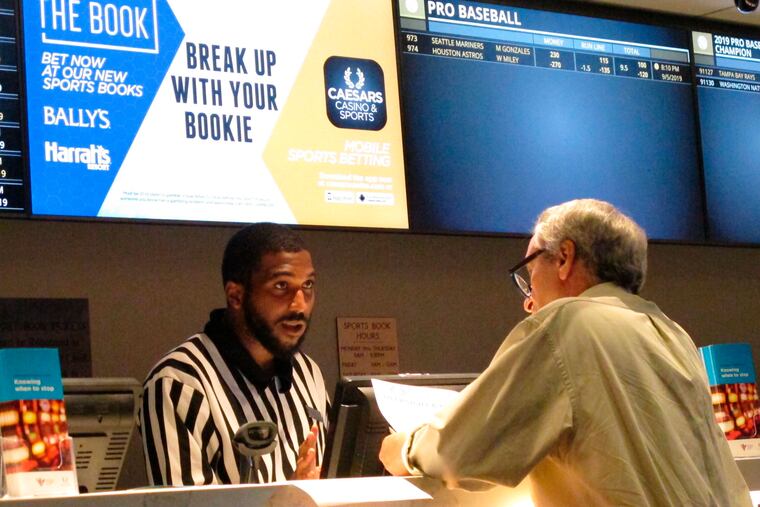Sports betting is making it harder to enjoy the game | Opinion
If all the talk is about gambling, it makes me tune out.

In May 2018, the Supreme Court ruled that states outside of Nevada could legalize sports betting. The case originated from a suit filed several years earlier in New Jersey by then-Gov. Chris Christie; another Jersey guy, Justice Samuel Alito, wrote the majority opinion. Sports gambling, online and off, has been legal and operational in both New Jersey and Pennsylvania for the past few years.
The changes since 2018 have been jarring, and anyone who watches sports has certainly noticed. Everything from game broadcasts to commercials to the stadium experience has become oriented around gambling. Fans can now open an app and place a bet, or several, almost as easily as they send a text. Countless betting apps, most of them associated with casinos or fantasy sports companies, have come online, and the gambling industry has become one of the dominant purchasers of advertising during sporting events, right up there with beer and cars.
Sports leagues used to be so fearful of gambling scandals that they avoided Las Vegas; now that city has NFL and NHL teams. In 2024, Vegas will host its first-ever Super Bowl. Some teams have even announced plans to put sportsbooks in the stadiums themselves. Here in Philadelphia, Live! Casino recently opened near the stadiums, which takes bets at FanDuel Sportsbook. Local restaurateur Stephen Starr is launching Bankroll Club, a sports and entertainment venue geared toward gamblers, in the Center City building that once housed the Boyd Theatre.
These changes are also coming to radio and television. One radio station in town, WDAS-AM, switched in 2019 to a betting-centric format called The Gambler. In many cities, although not in Philadelphia, the former Fox Sports regional sports networks have rebranded as Bally Sports, integrating odds and gambling talk directly into their broadcasts.
This has provided a lot of entertainment to gamblers, and a lot of money for the industry — over $3 billion in the first 10 months of 2021, according to the American Gaming Association, which marked a 230% jump over the year before. Money that long flowed into the pockets of bookies and offshore outfits is being redirected toward corporations, sports leagues, and ultimately, thanks to taxation, the public coffers.
However, the sports gambling boom is less entertaining for people like me: sports fans who don’t gamble and aren’t particularly interested in gambling.
When I spend a Sunday afternoon watching football, almost every other commercial is for betting apps. When I walk into Lincoln Financial Field, I notice the Fox Bet Lounge and ads for other gambling operations. If only for a moment, this takes me out of the experience and detracts from the excitement of a close game or rare athletic achievements.
For most of my lifetime, gambling was far less of a mainstream topic in sports. Fans made bets, of course, but teams and leagues actively discouraged gambling, often making examples of athletes like Pete Rose who violated gambling rules. The subject was rarely mentioned on sports broadcasts, aside from Al Michaels dropping winking references to point spreads in the waning moments of Sunday Night Football blowouts.
Announcers no longer feel the need to speak in euphemisms about odds and point spreads. If you go to a sports news website like CBSsports.com, it’s not just the ads that feature gambling, but more and more of the content.
I don’t have any moral objections to sports gambling. A lot of my friends enjoy it. I’ve tried a couple of times but it wasn’t for me. Following my own teams is enough to worry about on a Sunday without also having to keep an eye on whether a five-team parlay is going to pay off.
I’m not for a moment in favor of making sports betting illegal again. I’m more sympathetic to arguments that sports gambling is regressive, since the house always wins. A great deal of money flows from not-so-wealthy bettors to wealthy corporations. I also worry that sports gambling is a bubble that’s not economically sustainable, which cable news host Chris Hayes compared last month to “real housing-market-in-2005 vibes.”
Sports, for me, is about rooting for my teams, following them all year round, and waiting for word on whether a big trade is going down. But these days, it’s not easy to be a non-gambling sports fan, because there’s just no escaping betting talk.
Stephen Silver is a journalist and film critic who lives in Delaware County.